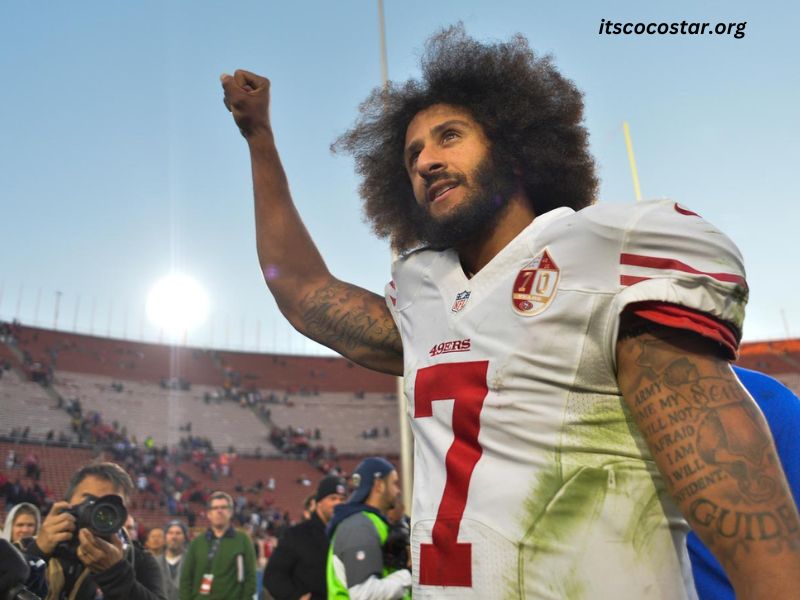In the world of professional sports, athletes are often revered for their extraordinary abilities on the field. However, there are some athletes whose actions off the field become just as, if not more, impactful than their performances in their respective games. Colin Kaepernick, the former quarterback for the San Francisco 49ers, is one such athlete whose courage, in the face of fear and adversity, has transformed him into a symbol of social justice and activism. His decision to kneel during the national anthem in 2016 to protest racial injustice and police brutality became one of the most controversial and influential moments in modern sports history.
This article explores Kaepernick’s journey, his decision to take a stand (or kneel), the challenges he faced, and the lasting impact of his actions on both the world of sports and society.
The Rise of Colin Kaepernick
Colin Kaepernick was born on November 3, 1987, in Milwaukee, Wisconsin, and was adopted by Rick and Teresa Kaepernick, a couple who supported him in his pursuits. Growing up in a predominantly white community, Kaepernick faced challenges stemming from his biracial identity. As a child, he was an accomplished athlete, excelling in multiple sports, including football, baseball, and basketball. He played quarterback at the University of Nevada, where he showcased his exceptional skills, combining speed, strength, and a strong arm. His performance in college led him to be drafted by the San Francisco 49ers in the second round of the 2011 NFL Draft.
Kaepernick quickly became known for his on-field talent, leading the 49ers to a Super Bowl appearance in the 2012 season. His impressive athleticism and ability to perform in high-pressure situations made him one of the most exciting quarterbacks in the league. Yet, it was his actions off the field that would soon redefine his legacy.
The Decision to Kneel
In 2016, Colin Kaepernick made a bold and highly controversial decision. As the national anthem played before a preseason game, he chose to kneel rather than stand, a gesture meant to protest the systemic racism, police brutality, and inequality faced by Black Americans. Kaepernick’s actions were immediately met with backlash, with many questioning his patriotism and loyalty to the country. Critics argued that kneeling during the national anthem disrespected the military and the flag, while supporters saw it as a powerful stand against injustice and oppression.
Kaepernick explained his decision by stating, “I am not going to stand up to show pride in a flag for a country that oppresses Black people and people of color.” His act of protest was inspired by the growing awareness of police violence against Black Americans, particularly the deaths of individuals like Michael Brown, Eric Garner, and Tamir Rice, who had died at the hands of law enforcement officers. Kaepernick’s decision was initially met with mixed reactions. Some saw him as a hero, while others viewed him as unpatriotic.
The gesture quickly ignited a national conversation about race, social justice, and the role of athletes in addressing these issues. Kaepernick’s protest was not an isolated act. In the months that followed, other athletes, including NFL players, NBA stars, and even high school students, began kneeling or raising fists during the anthem to join in the protest against racial injustice.
Courage in the Face of Fear
Kaepernick’s decision to kneel was an act of courage. The pressure to conform to traditional expectations of athletes—who were often expected to avoid politics and remain neutral on social issues—was immense. Many athletes feared that speaking out on controversial issues would negatively affect their careers, sponsorships, and public image. By choosing to protest, Kaepernick risked his career, his public reputation, and the relationships he had built in the NFL.
His fears were not unfounded. Kaepernick faced immediate consequences for his protest. Although his performance on the field had declined after the 2012 Super Bowl loss, his talent as a quarterback was still undeniable. However, after kneeling during the anthem, Kaepernick was not offered a contract for the 2017 season, despite being considered one of the top available quarterbacks. Many speculated that his protest had led to blackballing by NFL team owners, with some reports suggesting that the league actively worked to prevent him from playing.
Kaepernick’s courage to continue protesting in the face of professional consequences highlighted his commitment to his beliefs. He knew that his actions could cost him his career, yet he remained steadfast, refusing to back down from his cause. This unwavering determination demonstrated the deep conviction behind his protest and set him apart as an athlete willing to make personal sacrifices for the greater good.
The Impact of Kaepernick’s Protest
The ripple effect of Kaepernick’s protest was immediate and far-reaching. While his actions were divisive, they also sparked a nationwide conversation about racial inequality, police brutality, and the power of activism. His protest catalyzed a larger movement, with athletes, celebrities, and activists using their platforms to raise awareness of social issues.
One of the most significant outcomes of Kaepernick’s protest was the way it shifted the discourse around athlete activism. Before Kaepernick, athletes like Muhammad Ali, Jackie Robinson, and Arthur Ashe had used their platforms to advocate for civil rights and social justice. Kaepernick’s protest revived this legacy, demonstrating that athletes could still play a pivotal role in shaping social change.
Moreover, Kaepernick’s protest prompted discussions about the role of patriotism, the national anthem, and the American flag. For many, the protest was seen as an affront to the country and its values. For others, it was a necessary challenge to the idealized image of America, urging the country to confront its flaws and address deep-seated racial injustice. The backlash against Kaepernick also sparked a broader debate about free speech and the right to protest, highlighting the tension between individual expression and societal norms.
Kaepernick’s protest also highlighted the role of the media in shaping public perception. His decision to kneel was widely covered by the press, both domestically and internationally, with journalists and pundits offering their opinions on the matter. While some outlets criticized him, others praised his courage. The media played a crucial role in amplifying Kaepernick’s message, both for better and for worse.
Kaepernick’s Continued Advocacy
Although Kaepernick was not signed by any NFL team after his protest, his activism did not end there. He used his platform to continue advocating for social justice causes, founding the “Know Your Rights Camp,” which focuses on educating and empowering marginalized youth. The camp offers free workshops and resources on topics like self-empowerment, civil rights, and how to interact with law enforcement in a safe and respectful manner.
In addition to his work with the Know Your Rights Camp, Kaepernick has donated millions of dollars to organizations that support social justice initiatives. His commitment to activism has been consistent, and his work continues to inspire individuals to take action in their own communities.
In 2019, Kaepernick was awarded the Sports Illustrated Muhammad Ali Legacy Award, which recognized his efforts to use his platform for positive change. The award is given to athletes who have made a significant impact in the areas of social justice and activism, and Kaepernick’s name was added to a long list of athletes who have used their platform to challenge injustice.
The Legacy of Colin Kaepernick
As time has passed, the perception of Colin Kaepernick’s protest has evolved. Initially seen by many as a divisive and unpatriotic act, Kaepernick is now viewed by many as a hero who sacrificed his career for a cause larger than himself. His actions have inspired a generation of athletes and activists to take a stand against injustice, and his influence extends far beyond the world of sports.
Kaepernick’s legacy is not just about his protest during the national anthem. It is about the courage to stand up for what is right, even when the consequences are dire. His actions remind us that true courage is not the absence of fear, but the willingness to act in spite of it.
In the years following his protest, Kaepernick’s message of social justice and activism has resonated with people around the world. His legacy is a testament to the power of individuals to create change, and his story will continue to inspire future generations to have the courage to speak out in the face of adversity.
Conclusion
Colin Kaepernick’s decision to kneel during the national anthem was an act of extraordinary courage. In a world where athletes are often pressured to remain silent on social issues, Kaepernick chose to use his platform to raise awareness about racial injustice and police brutality. His actions sparked a national conversation, forced the sports world to confront uncomfortable truths, and reignited a legacy of athlete activism.
Despite the challenges and backlash he faced, Kaepernick’s commitment to social justice has solidified his place as one of the most influential figures in modern sports history. His legacy is a powerful reminder that true courage lies not in the absence of fear, but in the willingness to stand up for what is right—even when the world may stand against you.






